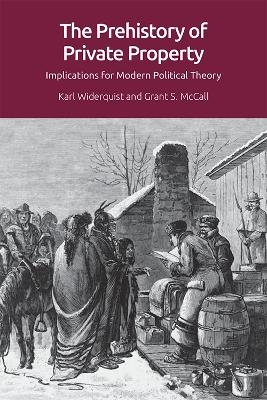
The Prehistory of Private Property
Edinburgh University Press (Verlag)
978-1-4744-4743-0 (ISBN)
Examines the origin and development of the private property rights system from prehistory to the present day
Traces the origin and development of the private property rights system from prehistory to the present day showing that it was not the product of 'appropriation' and 'voluntary trade' but of a long history of violent aggression
Reviews the long history of contradictory explanations why inequality is supposedly natural and inevitable or an inevitable feature of a free society
Uses anthropological evidence to show that some societies have maintained strong equality and extensive freedom
Addresses the negative-freedom argument for the market economy by showing that the hunter gatherer band economy has much more extensive negative freedom
This book debunks three false claims commonly accepted by contemporary political philosophers regarding property systems: that inequality is natural, inevitable, or incompatible with freedom; that capitalism is more consistent with negative freedom than any other conceivable economic system; and that the normative principles of appropriation and voluntary transfer applied in the world in which we live support a capitalist system with strong, individualist and unequal private property rights. The authors review the history of the use and importance of these claims in philosophy, and use thorough anthropological and historical evidence to refute them. They show that societies with common-property systems maintaining strong equality and extensive freedom were initially nearly ubiquitous around the world, and that the private property rights system was established through a long series of violent state-sponsored aggressions.
Karl Widerquist is Professor of Political Philosophy at SFS-Qatar, Georgetown University. He is co-editor of Prehistoric Myths in Modern Political Philosophy(with Grant S. McCall, Edinburgh University Press, 2017), Basic Income: An Anthology of Contemporary Research (with Yannick Vanderborght, Jose Noguera, and Jurgen De Wispelaere, Wiley-Blackwell, 2013), Exporting the Alaska Model: Adapting the Permanent Fund Dividend for Reform around the World (with Michael W. Howard, Palgrave-MacMillan, 2012), The Ethics and Economics of the Basic Income Guarantee (with Michael Anthony Lewis and Steven Pressman, Ashgate, 2005) and co-author of Economics for Social Workers: The Application of Economic Theory to Social Policy and the Human Services (with Michael Anthony Lewis, Columbia University Press, 2002). He was a founding editor of the journal Basic Income Studies, and he has published dozens of scholarly articles.Grant S. McCall is Associate Professor in Anthropology at Tulane University, as well as the director of the Center for Human-Environmental Research, a New Orleans-based nonprofit research institute aimed at exploring and improving human responses to environmental change. His publications include Prehistoric Myth and Modern Political Philosophy (co-editor with Karl Widequist, Edinburgh University Press, 2017), Strategies for Quantitative Research: Archaeology by Numbers (Routledge, 2018) and Global Perspectives on Lithic Technologies in Complex Societies (co-editor with Rachel Horowitz, University of Colorado Press, 2019).
| Erscheinungsdatum | 02.12.2022 |
|---|---|
| Verlagsort | Edinburgh |
| Sprache | englisch |
| Maße | 156 x 234 mm |
| Themenwelt | Naturwissenschaften ► Geowissenschaften ► Geografie / Kartografie |
| Sozialwissenschaften ► Politik / Verwaltung ► Politische Theorie | |
| ISBN-10 | 1-4744-4743-0 / 1474447430 |
| ISBN-13 | 978-1-4744-4743-0 / 9781474447430 |
| Zustand | Neuware |
| Haben Sie eine Frage zum Produkt? |
aus dem Bereich


